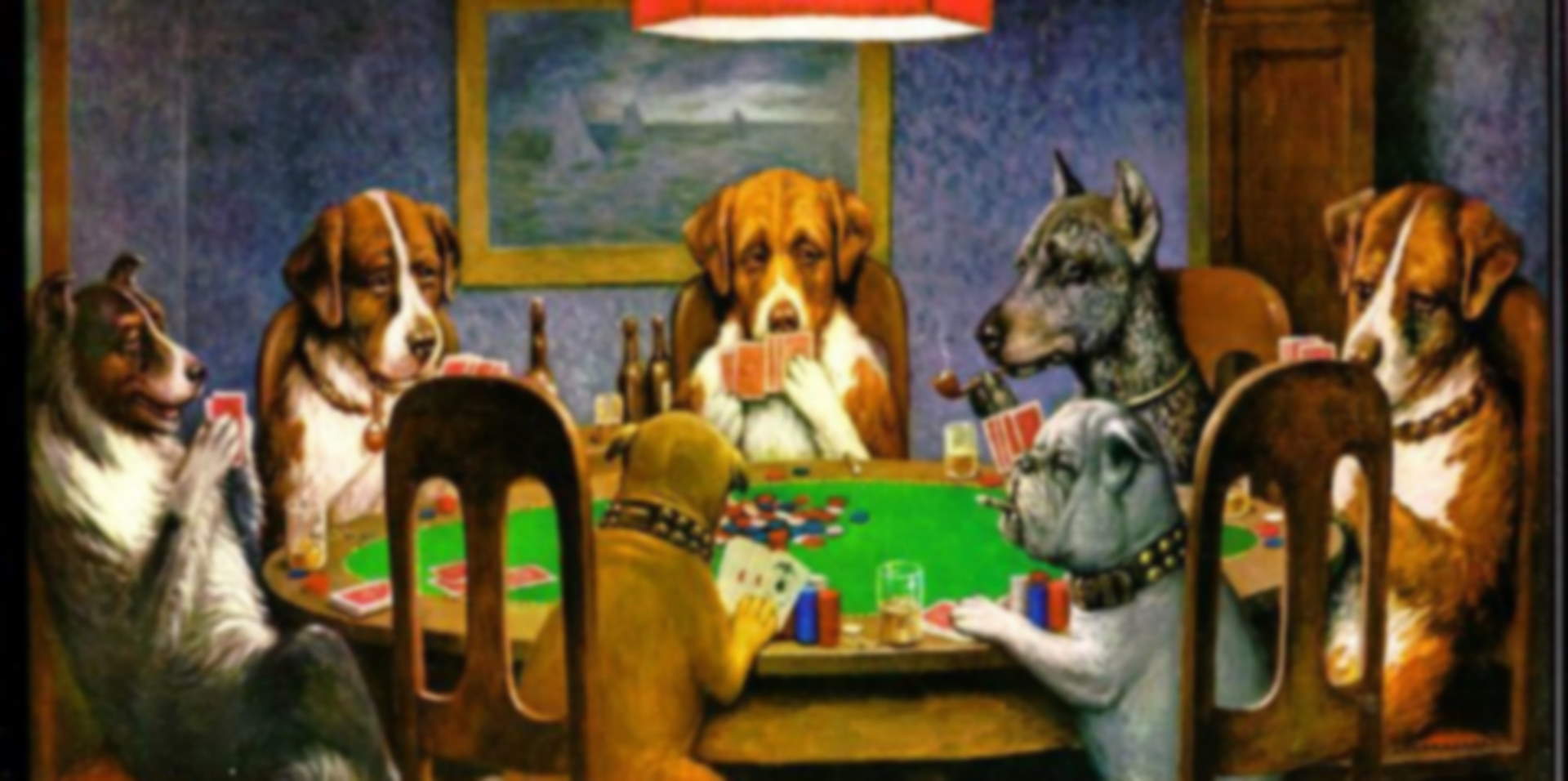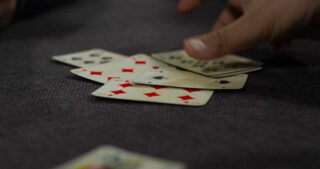/ 
There is no one in the poker world quite like Sammy Farha. Dashing and debonair, Farha is part James Bond, part Humphrey Bogart, part Hugh Hefner—all wrapped up into a five-foot-nine dynamo of a man with an unrelenting passion for fast living and high-stakes gambling.
Farha burst upon the poker scene a decade ago when he won a gold bracelet in the pot-limit Omaha championship at the 1996 World Series of Poker. But it wasn’t until his alluring television appearance on ESPN in the 2003 main event that “Sammy Farha” became a household name. If the World Series was all about style, then Farha would have been its champion long ago. Farha blitzed through 837 players that fateful year. All that stood in the way of Farha and a $2.5 million cash prize was a previously-unknown accountant from Tennessee named Chris Moneymaker.What happened at that final table three long years ago is no longer a mystery. Moneymaker won. But in many ways, Farha won too. Like it or not, Sammy Farha was a bona fide poker celebrity.Farha has played in many poker tournaments and high-limit cash games since then, with mixed results. Six-figure money swings are not only quite common, but a daily occurrence. The self-made Lebanese-born multi-millionaire is an attraction to any poker game, which is why he is perhaps television’s favorite poker face.In what could very well have been one of the toughest fields in poker history, 265 players – the vast majority of them former WSOP gold bracelet winners, top-notch tournament players, and high-limit cash-game specialists – entered the $5,000 buy-in Omaha High-Low Split world championship. After 20 hours of play extended over two long days (three actually, since the final table went way past midnight), 256 players had been eliminated and the final table was set.
Farha’s competition was formidable. The biggest menace was poker marvel Phil Ivey, shooting for gold bracelet number six. Mike Wattel and Brian Nadell also brought many years of top-flight tournament experience to the final table. There was also the top Russian poker pro Kirill Gerasimov. Rounding out the field were five other aspiring champions eager to notch their first World Series win.
The final table started at close to the midnight hour, which was a shame because fewer people than otherwise might have been anticipated were present to see yet another spectacular WSOP final table.
Seat 1 – Jim Ferrel
Seat 2 – Jeff King
Seat 3 – Mike Wattel
Seat 4 – Phil Ivey
Seat 5 – Sam Farha
Seat 6 – Kirill Gerasimov
Seat 7 – Brian Nadell
Seat 8 – Ryan Hughes
Seat 9 – Mike Henrich
Ryan Hughes arrived short-stacked. The 25-year-old poker pro from Phoenix flew away when his opponent scooped a big pot with a wheel – good for both the high and low. Ninth place paid $24,910.
Dr. Jim Ferrel was discharged from the final table in a monster five-way pot which concluded when Ferrel’s queen-high flush was outdone by Mike Wattel’s ace-high flush. Ferrel, a 65-year-old physician retired for the night as the eighth-place finisher, good for $37,365.
Jeff King was perilously low on chips and made his final stand with A-2-5-9. King faced off against Mike Henrich’s A-K-J-3. When the final board showed Q-J-5-6-J, Henrich had trip-jacks and King had a seventh-place finish. The former poker dealer from Connecticut raked in $49,820.
Brian Nadell has been a steady tournament performer for over a decade. He’s made innumerable cashes and countless final tables, thus earning well-over seven figures. Nadell’s aspiration of winning his first gold bracelet was cut off however, when Kirill Gerasimov completed a straight and eliminated the 49-year-old poker pro in sixth place. Nadell added $62,275 to his poker bankroll.
Mike Wattel won a WSOP gold bracelet in the $1,500 buy-in Omaha High-Low championship back in 1999. He hoped to add to his jewelry collection with another win. Wattel enjoyed the chip lead for a good part of his stay at the final table, but ended up going out a disappointing fifth. After losing a few key pots and many of his chips, Wattel took a bad beat when his locked-low was counterfeited on the river, thus allowing Sammy Farha to scoop the decisive pot. Wattel, who finished 95th in the main event last year (5,619 entries), this time cashed for $74,730.
Mike Henrich, a firefighter from Omaha, Nebraska was extinguished when his A-Q-J-4 was bested by Kirill Gerasimov’s A-10-8-2. The final board showed J-7-6-4-9 giving Gerasimov a jack-high straight. Henrich was out in fourth place with $87,185.
Kirill Gerasimov, one of the few Russian-born players on the poker circuit, was eliminated next when Sammy Farha scooped a large pot with a flush and a made-low (Gerasimov’s cards were not seen). Gerasimov, who finished fifth in the 2004 WSOP Pot-Limit Omaha championship, took third place this time. He collected $112,095.
With all due respect to the other finalists, this was the heads-up match that everyone wanted to see. In a clash tailor-made for the poker world’s eyes, an ESPN television crew was on hand to film the final hour. With about 1,300,000 chips in play and the betting limits set at 25,000-50,000, two or three scooped pots was all it took to shift the momentum from one player to the other. Both players began heads-up play about even. Then, Farha enjoyed a gust of wind in his sails late in the tournament, as he scooped a few key pots, increasing his chip lead to nearly 4 to 1. Nearing 4:00 AM, the final hand of the night came when Farha made two pair – jacks and sevens against a (losing) hand not shown by Ivey.
Phil Ivey, unaccustomed to finishing second, received $219,208 in prize money. The 29-year-old poker prodigy won his fifth gold bracelet last year. He is one of only two players ever to win three WSOP titles in a single year (in 2002 – Ted Forrest is the other).
The champion, Sammy Farha arrived in the United States in 1978 to attend college. He graduated from the University of Kansas. Farha was a successful pool player before becoming a full-time poker pro. In fact, he has played just about every kind of game for big money, including video games, pinball, and backgammon.
Given Farha’s enigmatic character, it is practically impossible to measure the true impact or meaning of his WSOP victory. On one hand, Farha was delighted to win his first gold bracelet in ten years. On the other hand, the prize money he received—$398,560 – is roughly equal to the typical buy-in at Farha’s regular poker game. That makes this World Series of Poker victory but a pit stop in the fast-lane that is Sammy Farha’s life.
Dieser Artikel erschien auf PokerOlymp am 19.04.2007.


